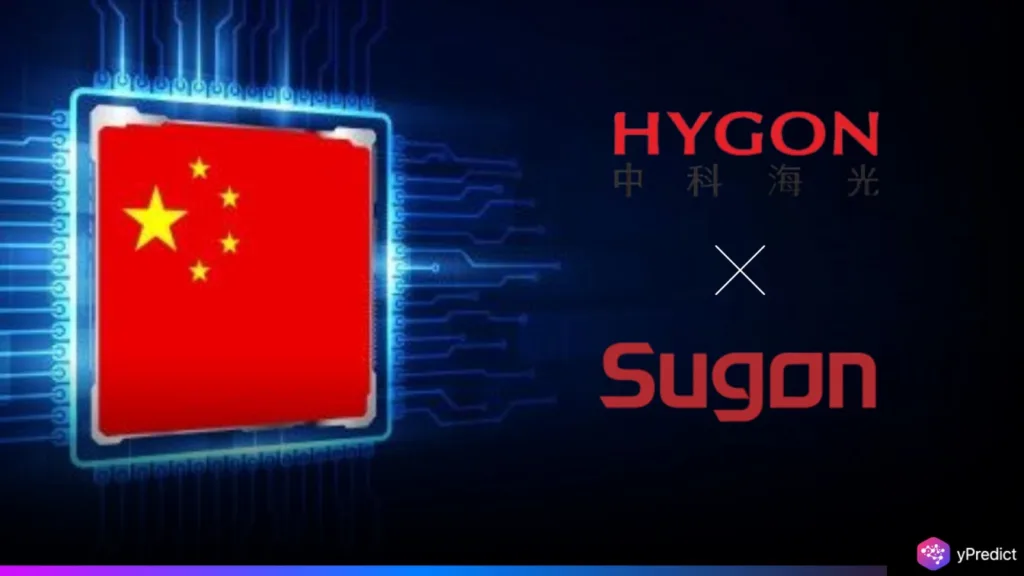
In a major step toward technological self-sufficiency, China’s state-backed Hygon and Sugon announced a strategic merger to boost AI capabilities. The all-share deal, disclosed in Shanghai Stock Exchange filings, aims to create a vertically integrated leader in China’s tech ecosystem. This Hygon Sugon AI Chip Merger combines Hygon’s x86 CPU design expertise with Sugon’s strength in high-performance computing to advance semiconductors and supercomputing.
As both companies face continuous US sanctions, the merger is an important step in China’s larger ambition to develop a secure, domestic digital ecosystem amidst rising geopolitical and supply chain conflicts.
Strategic Impact of the Hygon Sugon AI Chip Merger
According to The South China Morning Post, Hygon Information Technology and Sugon, also known as Dawning Information Industry, have agreed to merge. This strategic alliance comes as Beijing intensifies efforts to fortify its domestic tech ecosystem in the face of increasing U.S. export restrictions. Both firms are key players in China’s tech ecosystem and are state-backed, reflecting the government’s intent to reduce dependence on U.S.-sourced technology.
The Hygon Sugon AI Chip Merger will integrate Hygon’s chip design with Sugon’s server manufacturing, creating a vertically aligned entity positioned to meet rising local demand amid tightening U.S. export controls.
Hygon announced in Sunday’s Shanghai Stock Exchange filings that it will acquire Sugon through a “merger by absorption” share swap. The deal involves Hygon offering A-shares to Sugon’s current shareholders in exchange for their holdings in the company. Both companies plan to raise additional funds through a follow-on share offering, though details on usage remain undisclosed. The merger still requires shareholder and regulatory approval, and neither company has released a timeline or valuation for the transaction.
In 2024, Hygon’s revenue jumped over 50%, reaching 9.16 billion yuan, while Sugon’s revenue declined to 13.2 billion yuan. Both companies reported similar net income figures, each posting approximately 1.9 billion yuan during the same financial reporting period. As part of the merger, Hygon will issue new shares to Sugon shareholders and raise funds for AI infrastructure research. The additional capital will support the development of AI chips and data infrastructure, reinforcing China’s push for technological self-sufficiency and innovation.
Merging Chip and Compute Power
Hygon, initially established through a licensing partnership with AMD, earned recognition for designing processors based on x86 architecture standards. Although U.S. sanctions disrupted the collaboration in 2019, Hygon has since advanced its capabilities through independent chip development efforts. Recently, Hygon signaled plans to launch a 128-core processor supporting 512 threads, underscoring its ambitions in AI and data centers.
Founded in 1996, Sugon maintains close ties with the Chinese Academy of Sciences and leads in supercomputing and server solutions. The company has developed several systems listed in the TOP500 global supercomputer rankings, showcasing its technological leadership and innovation. Sugon also holds a major equity stake in Hygon, reinforcing their strategic alignment and shared ambitions in China’s tech landscape.
Both firms face U.S. export restrictions over alleged military ties. Their merger consolidates expertise in processors and servers, aiming to bolster China’s self-reliance in high-performance computing. This vertical integration is set to streamline innovation and reduce dependence on foreign technology amid rising geopolitical pressures.
Conclusion
Although the deal still awaits shareholder and regulatory approval, analysts expect it to proceed due to both firms’ state-backed status. Industry experts believe the merger could become a model for future Chinese tech consolidations in quantum computing, networking, and memory production.
Analysts view the Hygon Sugon AI chip merger as a key step in China’s broader strategy to build a resilient, domestically driven tech ecosystem capable of supporting AI, big data, and cloud infrastructure at scale. As global geopolitical tensions reshape supply chains, this partnership underscores China’s commitment to advancing its national computing infrastructure through homegrown solutions.






